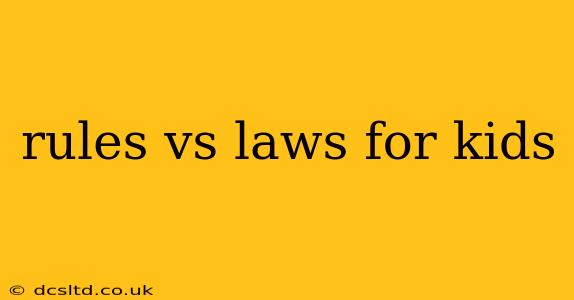Learning the difference between rules and laws is a crucial step in understanding societal expectations and personal responsibility. While both guide our behavior, they differ significantly in their scope and consequences. This guide explains the key distinctions in a way that's easy for kids to grasp.
What are Rules?
Rules are guidelines set by individuals or groups to maintain order and ensure safety within a specific setting. Think about the rules at your school, your home, or even your favorite sports team. These rules are created to help things run smoothly and fairly.
Examples of Rules:
- At school: Raise your hand before speaking, walk in the hallways, no running in the classroom. These rules help maintain a learning environment where everyone feels safe and respected.
- At home: Clean your room, do your chores, be respectful to your siblings. These rules help maintain a tidy and harmonious home life.
- At a game: Follow the referee's instructions, play fairly, show good sportsmanship. These rules ensure a fun and safe game for everyone involved.
Consequences of Breaking Rules:
The consequences for breaking rules vary depending on where the rule is set. At school, it might be a warning, a loss of recess, or detention. At home, it might be losing a privilege, extra chores, or a time-out. These consequences aim to teach you responsibility and to encourage you to follow the rules in the future.
What are Laws?
Laws are rules created and enforced by the government to maintain order and safety across a whole community or country. These laws apply to everyone, and breaking them can lead to much more serious consequences than breaking a rule. They protect us, our property, and our rights.
Examples of Laws:
- Driving laws: You must wear a seatbelt, stop at red lights, and drive under the speed limit. These laws keep everyone safe on the roads.
- Criminal laws: You can’t steal, hit someone, or damage someone else's property. These laws protect people and their belongings.
- Environmental laws: Laws protecting our natural resources, like clean air and water, for the benefit of everyone. These laws help ensure a healthy planet for future generations.
Consequences of Breaking Laws:
Breaking laws can have serious consequences, including fines, community service, or even jail time, depending on the severity of the offense. The police and courts are responsible for enforcing these laws.
What's the main difference?
The main difference is who makes the rules and who enforces them. Rules are made by individuals or groups (parents, teachers, coaches) and are enforced by them. Laws are made by the government and are enforced by law enforcement officers. Rules govern smaller areas, whereas laws govern a whole country or community.
Are all laws rules? Are all rules laws?
All laws are rules, but not all rules are laws. Laws are a specific type of rule with significant authority and consequences.
Why are rules and laws important?
Rules and laws are important because they help create a safe, orderly, and fair society. They help us to live together peacefully and respectfully. They protect us from harm and ensure that everyone has a chance to thrive. By following rules and laws, we contribute to a better world for everyone.
What if a rule and a law conflict?
If a rule conflicts with a law, the law always takes precedence. For example, if a school rule says something that contradicts a law, the law must be followed.
This guide provides a basic understanding of the difference between rules and laws. As you grow older, you will learn more about the complexities of both. Understanding the distinction is crucial for becoming a responsible and contributing member of society.
